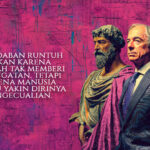
“If you are to be a leader, guiding the actions of many, strive to be good and kind, and endeavor to perfect your conduct,” wrote Ptahhotep, a vizier under King Isesi of Egypt’s Fifth Dynasty. Ptahhotep’s instructions, penned over 4,000 years ago and considered among the earliest known writings on leadership, underscore a timeless truth: effective leadership is crucial for the sustainability of civilizations. As Indonesia charts its course toward the Vision of Indonesia Emas 2045, we must heed these ancient lessons, recognizing the pivotal role of leadership in shaping our nation’s future.
This principle is echoed by renowned historian Arnold Toynbee, who distilled the history of 26 civilizations into a simple formula: challenge and response. He posited that the rise and fall of civilizations hinge on leadership responses to crises such as pandemics, wars, and other significant events. Similarly, Will and Ariel Durant argued that leadership failures often precede the downfall of great civilizations. These historical perspectives underscore that leadership can indeed make or break a nation. As Indonesia aims to achieve the Vision of Indonesia Emas 2045, these lessons serve as a potent reminder of the stakes involved.
Indonesia’s vision aims to transform into a high-income country, achieve significant economic growth, and become one of the world’s five largest economies by its 100th anniversary of independence. However, this path is fraught with challenges, primarily from leadership issues. In Strategi Transformasi Bangsa, Prabowo Subianto explains that Indonesia loses nearly 2,800 trillion rupiahs annually due to corruption and budget leaks. These issues underscore the urgent need for effective leadership to achieve these ambitious goals and avoid self-sabotage.
Effective leadership, as defined by John P. Kotter, a well-known expert on leadership and change, is the ability to achieve goals through guidance and cooperation with others. It transcends mere authority, focusing on collaboration and mutual goals. Similarly, Michael E. Porter, regarded as the father of modern strategy, explains that strategic leadership involves creating a unique and valuable position by choosing distinct activities that offer a sustainable competitive advantage. This leadership style requires vision, direction, and the ability to adapt to changing environments. In Indonesia’s context, this means crafting strategies that leverage our unique strengths while remaining responsive to global shifts.
To navigate these complexities, strategic leaders must possess several key skills, including anticipation, challenge, interpretation, decision-making, alignment, and learning. These skills enable leaders to detect threats and opportunities, question the status quo, synthesize complex information, make difficult decisions, build consensus, and foster a culture of continuous improvement. Jimly Asshiddiqie emphasizes that strategic leadership also requires character and integrity, ensuring leaders act with accountability and a focus on the common good. This holistic approach to leadership is essential for addressing Indonesia’s multifaceted challenges.
A prime example of effective strategic leadership is President Joko Widodo’s (Jokowi) downstreaming policy. Recognizing Indonesia’s vast natural resources, Jokowi banned the export of raw materials like nickel, bauxite, copper, and tin, shifting focus to processing these materials domestically. This policy faced significant opposition but ultimately increased the value of nickel exports from 3.3 billion USD to 33.8 billion USD annually. Jokowi’s strategic decision exemplifies loyalty to the nation, professional competence, and courage—key characteristics of effective leadership. This success story illustrates how visionary leadership can drive substantial economic transformation.
In stark contrast, Sri Lanka’s abrupt switch to organic farming presents a cautionary tale. In 2021, the country banned synthetic fertilizer and pesticide imports overnight, forcing millions of farmers to go organic. This move, intended to address health and environmental concerns, proved disastrous. Rice production dropped by 20 percent within six months, turning a self-sufficient nation into one that had to spend $450 million on rice imports—far more than the $400 million saved by banning fertilizers. The production of tea, the country’s major export, fell by 18 percent, exacerbating the economic crisis. By July 2022, inflation soared to 54.6 percent, pushing nine in ten families to skip meals and causing widespread unrest. This example highlights the need for thoughtful and strategic implementation of policies, considering both their short-term impacts and long-term sustainability.
Additionally, the fall of Enron demonstrates the catastrophic impact of poor leadership. Under Jeffrey Skilling, Enron’s leadership engaged in deceptive financial practices, prioritizing short-term profits over long-term sustainability. This led to the company’s bankruptcy in 2001, significant financial losses for investors, and job losses for over 20,000 employees. Enron’s failure is a stark reminder of the importance of integrity and ethical conduct in leadership. This cautionary tale serves as a critical lesson for Indonesian leaders as they strive to foster a culture of transparency and accountability.
As Indonesia strives towards its 2045 vision, the need for strategic leadership becomes even more paramount. This involves not only vision and direction but also the practical skills of statecraft—effective public policy formulation, international relations management, and national stability maintenance. Prabowo Subianto argues that Indonesia’s ideal leadership should combine the best elements of Western and Eastern leadership traditions, focusing on service and loyalty to the nation. This integrative approach can help create a leadership style uniquely suited to Indonesia’s context.
To cultivate such leaders, Indonesia must invest in sustainable leadership training programs, targeting young leaders with education in diplomacy, political economy, crisis management, and domestic policy. This aligns with Subianto’s vision of empowering human resources to drive national development. By preparing the next generation of leaders today, Indonesia can ensure a robust leadership pipeline for the future.
Furthermore, combating corruption and ensuring that policies serve the national interest are crucial. The downstreaming policy’s success highlights the benefits of strategic leadership, while Sri Lanka’s experience and Enron’s downfall underscore the need for careful planning, execution, and maintaining integrity. By fostering a culture of ethical conduct, Indonesia can build a solid foundation for sustainable growth and development.
In conclusion, strategic leadership and statecraft are essential for Indonesia to achieve its Vision of Indonesia Emas 2045. By learning from historical examples and focusing on developing leaders with vision, integrity, and adaptability, Indonesia can navigate the challenges ahead. Investing in young leaders and fostering a culture of service and ethical conduct will ensure that Indonesia not only meets its ambitious goals but thrives as a prosperous and influential nation on the global stage now and in the future. As Ptahhotep wisely advised, “If you are a leader, strive to establish lasting legacies, for true leadership is remembered by its enduring impact, long after words have faded.”
*This article is a shorter version of Effective Leadership Strategies: Realizing Indonesia’s Golden Vision 2045




